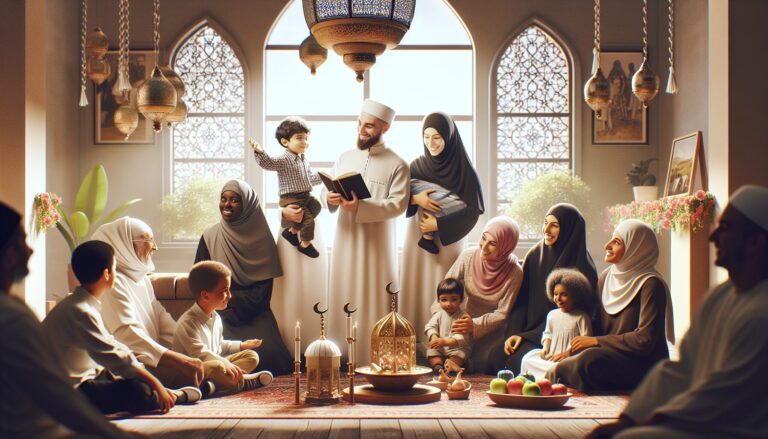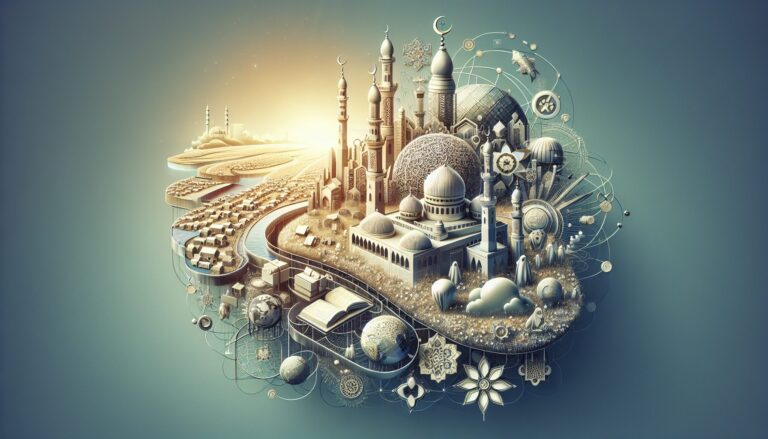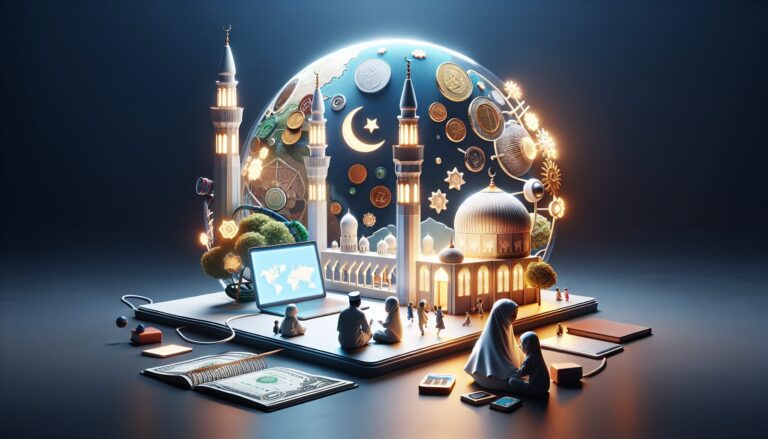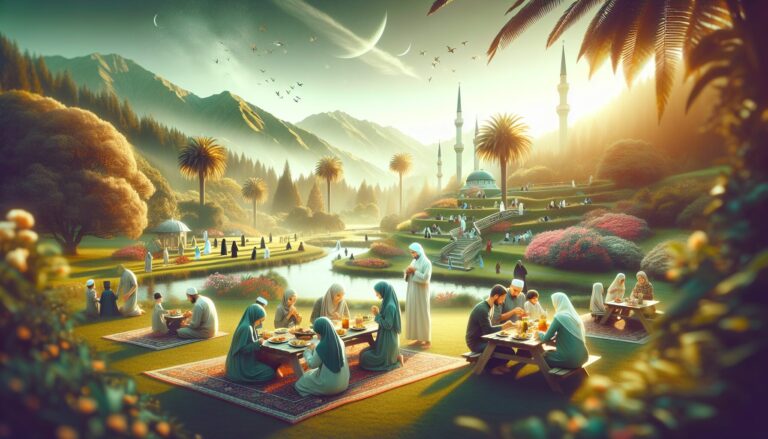Growing up, I cherished my family’s unique Islamic holiday traditions, especially baking ma’amoul cookies with my grandmother, whose stories and values were as integral as the cookies themselves. Traditions like these connect us to our heritage and faith, providing a sense of belonging in a changing world. In New Zealand, where cultures blend, Islamic traditions help preserve identity while embracing local culture, strengthening family bonds and creating lasting memories. For Muslims, traditions are crucial, passing on values and practices that define their way of life, especially in places where they are a minority. Celebrations like Eid al-Fitr and Eid al-Adha bring families together to share meals and engage in charity, emphasizing gratitude and community. Families often blend the old with the new, incorporating local customs, such as hosting a barbecue for Eid, which enriches the experience and keeps traditions vibrant for future generations.
Adapting Traditional Islamic Celebrations for Western Contexts
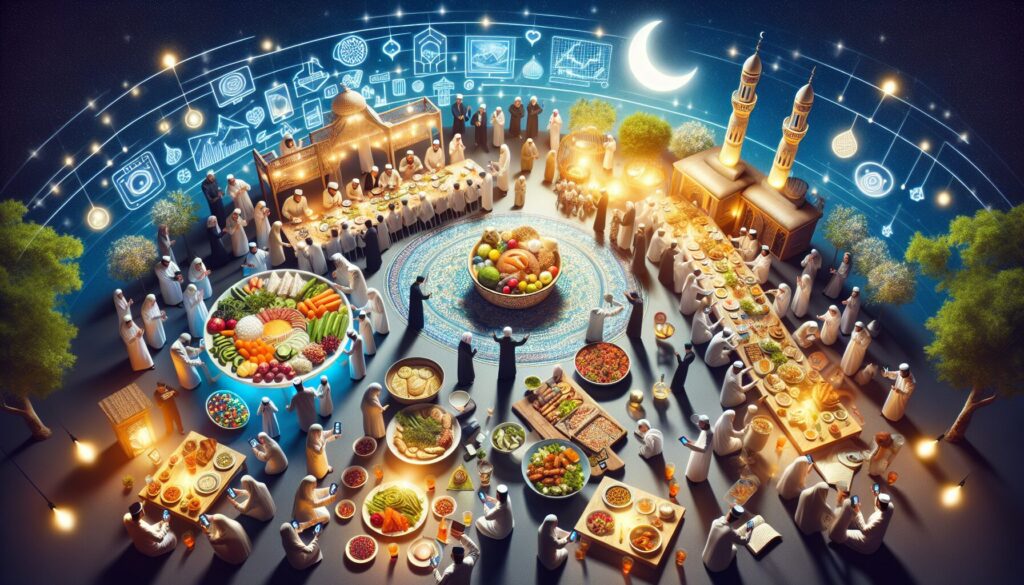
Adapting traditional Islamic celebrations to fit into the Western context can be a delightful journey. Blending local customs with Islamic traditions enriches celebrations and bridges cultural gaps. For instance, a friend of mine living in New Zealand shared a beautiful story of how her family invited their Kiwi neighbors for Eid al-Fitr. They shared ma’amoul and other treats, and it became a wonderful exchange of stories and laughter.
When adapting Islamic holidays, consider incorporating elements that resonate with the local community. One approach is to include New Zealand’s love for the outdoors by hosting family picnics in a local park for Eid. This not only celebrates the day with a feast but also aligns with the Kiwi spirit of enjoying nature. Another idea is to involve local schools or community centers in educational activities about Islamic holidays. This can foster understanding and appreciation among children and adults alike.
Infuse Local Traditions
Incorporating local traditions can be as simple as adding a Kiwi twist to your celebrations. Consider integrating popular New Zealand foods into your holiday meals alongside traditional dishes. For instance, serving pavlova—a beloved Kiwi dessert—could be a delightful addition to the Eid feast, creating a unique fusion of flavors.
Another way to adapt is through decor. Use local flowers, like the iconic pōhutukawa, for home decoration. This not only brightens up your space but also gives a nod to New Zealand’s natural beauty. You can even get crafty with kids, creating decorations that reflect both Islamic and Kiwi themes.
Community involvement is another key aspect. Partner with organizations such as Islamic Women’s Council of New Zealand or Federation of Islamic Associations of New Zealand to collaborate on events. This can help bring diverse communities together, fostering a sense of unity and collective celebration.
Hosting open houses during Islamic holidays is another great idea. Invite friends and neighbors to join in the festivities. Share stories, food, and traditions, and watch how these shared experiences create memorable bonds. These gatherings can transform a simple celebration into a community event, strengthening relationships and building mutual respect.
For families, creating new traditions is a way to make these holidays memorable. Whether it’s a family game day during Eid or a storytelling night about Islamic history, these activities can become cherished rituals that children look forward to each year. Encourage kids to participate in planning and preparation, giving them a sense of ownership and pride in their heritage.
The beauty of adapting Islamic celebrations in a Western context lies in the opportunity to blend cultures and create unique, memorable traditions. By embracing local customs and involving the community, these holidays can become a vibrant celebration of diversity and unity.
Incorporating Educational Activities into Islamic Holidays
Growing up, my family had this delightful tradition of reading stories from our rich Islamic heritage during holidays. I remember my dad pulling out a big, beautifully illustrated book that brought tales of courage and wisdom to life. It was like stepping into a time machine that whisked us away to ancient lands, leaving us wide-eyed and inspired. This personal memory made me realize how educational activities can create memorable Islamic holiday traditions for families. For those interested in cultivating similar experiences, consider creating a fun and educational Islamic weekend routine for kids that could spark a similar joy in your own family. Let’s explore some ideas that could make these moments truly special.
One fantastic way to incorporate educational activities is through arts and crafts that celebrate Islamic culture. Kids can create their own paper lanterns or design intricate henna patterns on paper. These activities not only ignite creativity but also provide a fun way to learn about cultural symbols and their significance. Additionally, organizing a small family play that depicts a historical event or a story from the Islamic tradition can be both educational and entertaining. Kids love dressing up and acting out their parts, immersing themselves in the story, and learning valuable lessons along the way.
Interactive Learning Experiences
Interactive learning experiences can also be a hit among families. Consider visiting an Islamic exhibition or a museum that features Islamic art and history. If you’re in New Zealand, check out Te Papa Tongarewa or Auckland Museum, as they sometimes host exhibitions that touch on Islamic culture. Such outings can spark discussions and curiosity, making the holidays both educational and fun. For a more localized experience, you can organize a scavenger hunt at home, where clues lead to different facts about Islamic history or figures. Kids love the thrill of the hunt and the satisfaction of discovering new knowledge.
Cooking together as a family can also be a delightful educational activity. Preparing traditional dishes and learning about their origins opens the door to fascinating conversations. For instance, while making ma’amoul, you can talk about how these delicious treats are made across different countries, each with its own twist. This hands-on activity is a blend of culture, history, and deliciousness that everyone can enjoy.
Consider setting aside a special time for storytelling sessions. Gather around and read stories that highlight Islamic values such as kindness, honesty, and perseverance. Books from authors like Rukhsana Khan or Hena Khan are wonderful resources to have on hand. These stories can inspire young minds and reinforce important values in a way that’s both engaging and meaningful.
Creating Lasting Memories Through Family Involvement
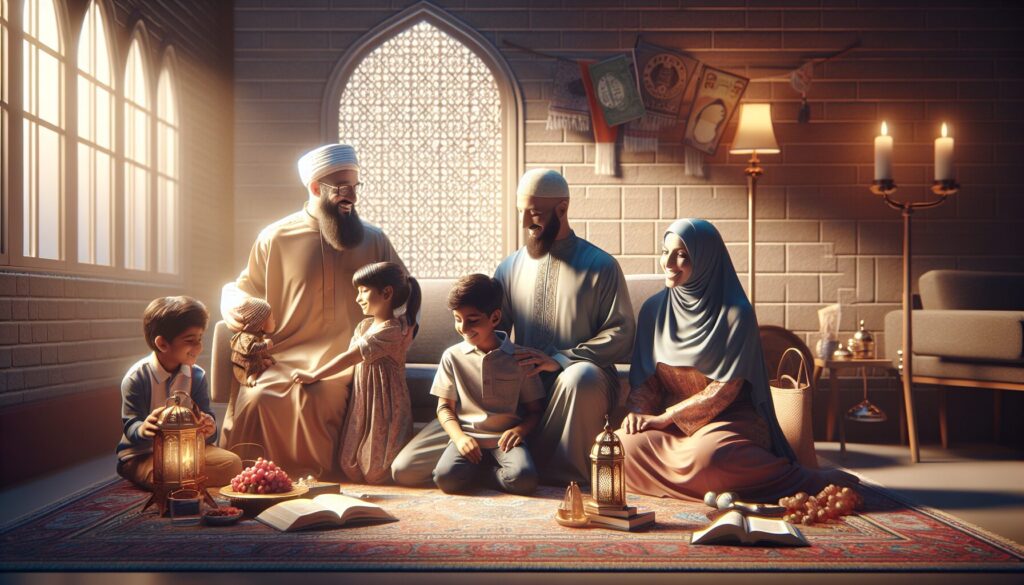
There’s something truly magical about creating lasting memories with family, especially during the holidays. I remember one particular Eid al-Fitr when my family decided to put our own twist on the celebrations. We decided to bake ma’amoul together. The aroma filled our home, and those moments, filled with laughter and love, are etched in my memory forever. This personal touch made our celebration unique and unforgettable.
In New Zealand, where diverse cultures blend beautifully, involving your family in holiday traditions can be a fantastic way to create lasting memories. Here are a few tips to make your Islamic holiday traditions truly memorable:
Engage the Entire Family
It’s essential to involve everyone, from the youngest to the oldest. You could start by organizing a day trip to Auckland Museum or Te Papa Tongarewa, where the whole family can learn about the rich tapestry of cultures that make New Zealand unique. This can spark conversations about the significance of your own traditions.
Another idea is to create a family tradition of cooking together. Whether it’s preparing a traditional dish or trying something new, the kitchen can be a hub of activity and joy. Encourage each family member to contribute, whether it’s chopping, stirring, or simply tasting. Cooking together fosters a sense of teamwork and creates opportunities for storytelling and laughter.
If you’re looking to add a creative touch, involve your family in crafting. Making decorations for your home or creating personalized cards for loved ones can be a fun and fulfilling activity. You can use materials inspired by the beautiful pōhutukawa tree, adding a Kiwi flair to your crafts.
Create Personal Rituals
Developing personal rituals can make your celebrations feel more intimate. Consider starting a family storytelling night where each person shares a memory or a story related to the holiday. This not only strengthens family bonds but also ensures the passing of traditions from one generation to the next.
Additionally, you could establish a tradition of visiting local places of interest. Exploring the natural beauty of New Zealand, like taking a family walk through a nearby park, can be a mindful way to appreciate the world around you. It’s a chance to disconnect from technology and connect with each other and nature.
Don’t forget the power of music and dance. Create a playlist of your favorite holiday songs and have a family dance-off. It’s a light-hearted way to release energy and enjoy each other’s company.
Incorporating these elements into your celebrations can transform them into memorable Islamic holiday traditions. By engaging your family in meaningful activities, you’re not just celebrating a holiday; you’re weaving a tapestry of memories that will be cherished for years to come.
Innovative Ideas for Celebrating Islamic Holidays in the West
Creating memorable Islamic holiday traditions in New Zealand can be such a delightful experience. Celebrating these special occasions in a land filled with natural beauty can truly be a joy. I have a wonderful memory from a family trip to New Zealand one Eid, where we decided to embrace the local environment by having a picnic under the magnificent pōhutukawa trees. The kids played around, and we shared our favorite ma’amoul with some curious locals who were just passing by. It was a moment that beautifully intertwined our traditions with the Kiwi way of life.
One innovative idea for celebrating Islamic holidays in the West is to blend local customs with your own. For instance, consider organizing a community iftar in a local park. This not only brings together families and friends but also involves the wider community. You can invite neighbors to join and experience the warmth and hospitality that these festivals bring. Auckland Council often supports such community events, providing spaces and sometimes even resources.
Another fantastic tradition could be a cultural exchange event. Host an open day at your local mosque or community center where people can learn about Islamic traditions, try on traditional clothing, and taste authentic dishes. This educates and fosters understanding, creating a more inclusive community. Collaborating with organizations like New Zealand Muslim Association can provide additional support and resources.
Creating Lasting Memories with Family Activities
Engaging children in the celebration is key to establishing traditions they’ll cherish. Why not start a craft day where the family creates decorations or gifts? Use natural materials from your surroundings, like flax, to make unique items that reflect both Islamic heritage and Kiwi culture. This hands-on approach not only makes the holiday more memorable but also instills a sense of pride and creativity in young ones.
Storytelling is another powerful tradition. Share stories about Islamic history and values, perhaps even under the stars during a family campout. New Zealand’s stunning landscapes offer the perfect backdrop for such activities. Imagine sitting by a campfire, sharing tales of wisdom and courage with children, as the Southern Hemisphere stars twinkle above.
Exploring local museums, like Te Papa Tongarewa or Auckland Museum, can also inspire holiday activities. These institutions often have programs and exhibits that celebrate cultural diversity, providing a fantastic opportunity to learn and celebrate your own heritage within a broader context.
By weaving local elements into your celebrations, you create a tapestry of traditions that’s uniquely yours. It’s all about making each holiday feel special and creating cherished memories with loved ones.
Fostering Interfaith and Community Connections
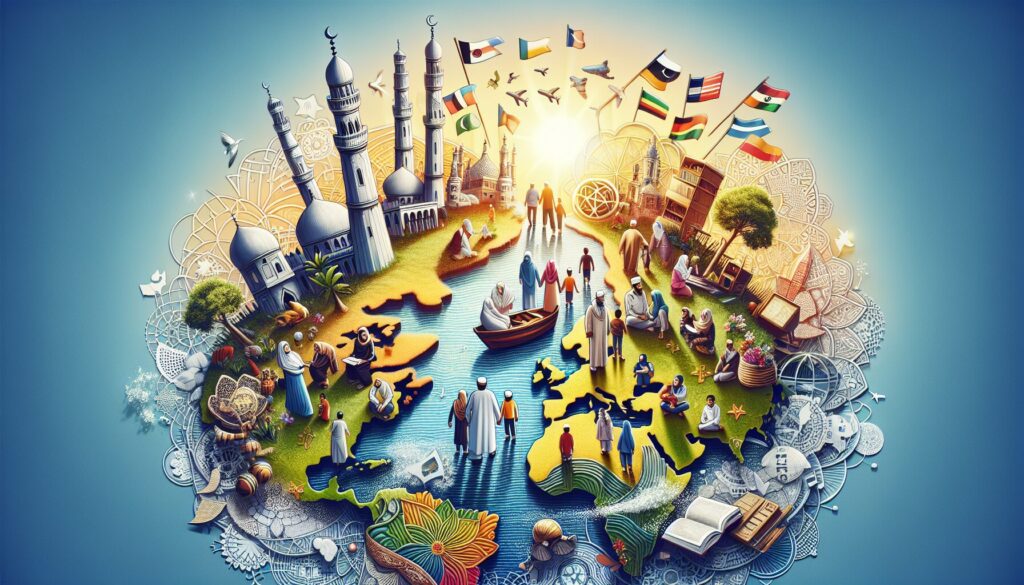
On my first trip to New Zealand years ago, I was invited to a community picnic organized by the New Zealand Muslim Association. It was one of those wonderfully warm days, where the sun seemed to wrap everyone in a cozy embrace. I remember standing under the shade of a pōhutukawa tree, chatting with folks from different backgrounds. It was fascinating to see how food and conversation can build bridges between cultures. That day, I realized the immense potential for fostering interfaith and community connections, especially during Islamic holidays.
Creating Memorable Islamic Holiday Traditions in New Zealand, like any other place, thrives on community spirit. One way to forge these connections is by hosting open events. Picture this: a neighborhood gathering to celebrate Eid al-Fitr, where everyone’s invited to partake in the joy. It’s an opportunity to share ma’amoul and other delightful treats while explaining their significance. This simple act of sharing food and stories can spark curiosity and understanding among diverse groups.
Another impactful way to foster connections is through collaborative charity work. Many mosques, such as those under the Auckland Council, often organize charity drives during Ramadan. By inviting local community members to contribute or volunteer, it creates a sense of unity and purpose. It’s a beautiful way of showing that despite different beliefs, shared values like compassion and generosity transcend barriers.
Embracing Cultural Exchange
Encouraging cultural exchange is another powerful tool. Schools and community centers can host workshops or cultural days. Imagine a day at Te Papa Tongarewa where children get to learn about Islamic art, music, and traditions through interactive exhibits. Such initiatives not only educate but also celebrate diversity, fostering mutual respect.
Let’s not forget the power of storytelling. Organizing storytelling sessions at libraries or community centers can captivate both young and old. It’s a fantastic way to convey the essence of Islamic traditions and values. These stories, often rich with lessons and morals, can resonate universally, drawing parallels with other cultural tales.
Participating in interfaith dialogues organized by groups like New Zealand Muslim Association can be enlightening. These sessions provide a platform for open conversation, where questions are welcomed, and myths can be dispelled. It’s a safe space to explore different perspectives and promote harmony.
Conclusion
Ultimately, creating memorable Islamic holiday traditions in New Zealand offers a beautiful opportunity to blend cultural heritage with local customs, fostering a sense of unity and belonging. By embracing these traditions, families can build lasting memories, enrich community connections, and promote understanding and respect across diverse backgrounds. Here’s to celebrating diversity with warmth and joy!
Continue Exploring
Transform your family interactions with our comprehensive guide to meaningful conversations. Dive into practical tips and insightful prompts that will bring your family closer than ever before.
Frequently Asked Questions
How can Islamic families in the West adapt their holiday traditions to include local customs?
Islamic families in the West can adapt their holiday traditions by blending local customs with their own. For example, they can host a barbecue for Eid, incorporate popular local foods like pavlova into their meals, and use local flowers for decoration. Inviting neighbors to join in celebrations and organizing community events can also foster cultural exchange and understanding.
What are some educational activities that can be incorporated into Islamic holidays for children?
Educational activities for children during Islamic holidays can include arts and crafts, such as creating paper lanterns or henna patterns, and organizing family plays depicting historical Islamic events. Visiting museums with Islamic exhibits or organizing scavenger hunts with clues about Islamic history can also be engaging. Storytelling sessions featuring Islamic values and cooking traditional dishes together can further enhance learning.
How can Islamic holiday celebrations foster interfaith and community connections in the West?
Islamic holiday celebrations can foster interfaith and community connections by hosting open events where everyone is invited to partake in the festivities. Sharing food and stories can build bridges between cultures. Collaborative charity work during Ramadan and participating in interfaith dialogues organized by local groups can also promote unity and understanding across different faiths and backgrounds.
Fatima Ansari is an Islamic educator and writer with over a decade of experience teaching Quran and Islamic studies to children and families in Western Muslim communities. Growing up in North America, she saw firsthand the challenges Muslim families face in balancing faith with modern life, which inspired her to share practical guidance rooted in the Quran and Sunnah. Her mission with E-Quran Learning is to make Islamic education accessible, relatable, and inspiring for Muslim families across the United States, United Kingdom, Canada, Australia, and New Zealand.

